医学英文论文写作U6-Discussion
医疗卫生英语六级作文
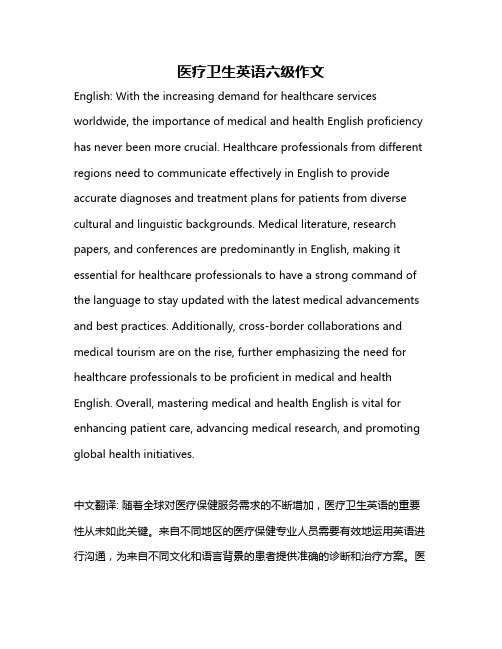
医疗卫生英语六级作文English: With the increasing demand for healthcare services worldwide, the importance of medical and health English proficiency has never been more crucial. Healthcare professionals from different regions need to communicate effectively in English to provide accurate diagnoses and treatment plans for patients from diverse cultural and linguistic backgrounds. Medical literature, research papers, and conferences are predominantly in English, making it essential for healthcare professionals to have a strong command of the language to stay updated with the latest medical advancements and best practices. Additionally, cross-border collaborations and medical tourism are on the rise, further emphasizing the need for healthcare professionals to be proficient in medical and health English. Overall, mastering medical and health English is vital for enhancing patient care, advancing medical research, and promoting global health initiatives.中文翻译: 随着全球对医疗保健服务需求的不断增加,医疗卫生英语的重要性从未如此关键。
医学相关话题的六级英语作文
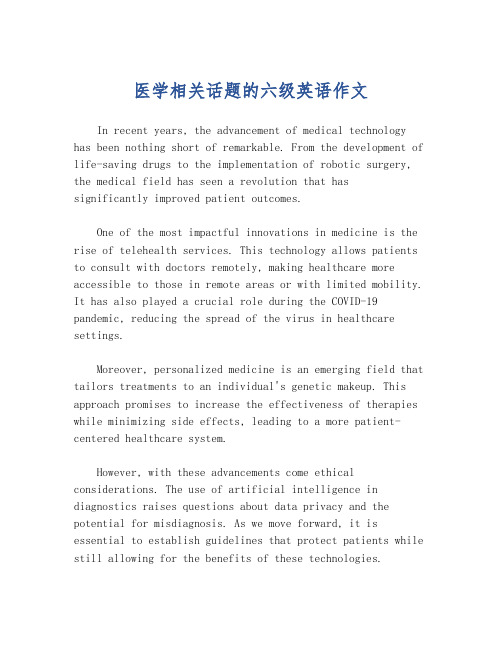
医学相关话题的六级英语作文In recent years, the advancement of medical technology has been nothing short of remarkable. From the development of life-saving drugs to the implementation of robotic surgery, the medical field has seen a revolution that hassignificantly improved patient outcomes.One of the most impactful innovations in medicine is the rise of telehealth services. This technology allows patients to consult with doctors remotely, making healthcare more accessible to those in remote areas or with limited mobility. It has also played a crucial role during the COVID-19 pandemic, reducing the spread of the virus in healthcare settings.Moreover, personalized medicine is an emerging field that tailors treatments to an individual's genetic makeup. This approach promises to increase the effectiveness of therapies while minimizing side effects, leading to a more patient-centered healthcare system.However, with these advancements come ethical considerations. The use of artificial intelligence in diagnostics raises questions about data privacy and the potential for misdiagnosis. As we move forward, it is essential to establish guidelines that protect patients while still allowing for the benefits of these technologies.Another critical issue is the accessibility of medical care. While technology has improved the quality of healthcare, it has also increased its cost. Ensuring that everyone can benefit from these advancements, regardless of their economic status, is a challenge that must be addressed.Lastly, the role of education in medicine cannot be overstated. As new technologies and treatments emerge, it is crucial that medical professionals are well-informed and trained to use them effectively. This includes not onlydoctors and nurses but also support staff and administrators.In conclusion, the future of medicine is bright but not without its challenges. By addressing these issues proactively, we can ensure that the benefits of medical advancements are shared by all, leading to a healthier and more equitable society.。
学术英语医学Unit6分析解析
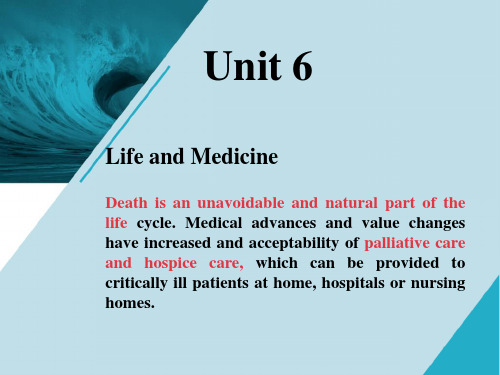
• Suggested answers
• Congestive: hyperemic • Disinfect: 除去(感染),给…消毒
• Chlorine is used to disinfect water.
– 氯用来给水消毒。
• Palliate: to palliate a disease • Dialysis or kidney dialysis is a method of
special equipment (like a hospital bed or bedside commode) • Health insurance • Planning by a professional, such as a hospital discharge planner or a social worker • Help from local governmental agencies • Doctor supervision at home
Unit 6 Life and Medicine
Text A
Critical reading and thinking
Topics for presentation
6 How has the meaning of palliative care changed?
Knowledge of the subject matter
Unit 6 Life and Medicine
Text A
Critical reading and thinking
Topics for presentation
5 How has the meaning of palliative care changed?
医学英文论文写作U6-Discussion

Step Four of Move 2
●
Our findings are similar to those of Tanaka
et al., who observed that ...
●
The present study differs from previous
studies including...
●
Permanent implantation of electrodes was thus necessary to achieve reproducible recordings in our study.
Step Four of Move 2
It compares and contrasts our new
It is a reiteration of the main observations. It is an explicit statement of the significance
of the results.
It justifies the results by confirming that the
methods were appropriate to the research question.
It compares and contrasts our new results
with those of previous studies.
It discusses the limitations in our paper and
results with those of previous studies.
It is often introduced with a very
医学论文英文发言稿范文

Ladies and Gentlemen,Good morning/afternoon. Today, I am honored to present a systematic review on the impact of telemedicine on access to healthcare. As we navigate through the digital era, telemedicine has emerged as a revolutionary tool that has the potential to transform the healthcare landscape. In this presentation, I will discuss the findings of our comprehensive review and highlight the key insights.Introduction:Access to healthcare is a fundamental human right, yet millions of people worldwide still face barriers in receiving timely and appropriate medical care. These barriers include geographical distance, lack of transportation, financial constraints, and limited healthcare resources. Telemedicine, or telehealth, offers a promising solution to these challenges by leveraging technology to provide medical services remotely.Methodology:Our systematic review aimed to evaluate the impact of telemedicine on access to healthcare. We conducted a thorough search of relevant literature, including peer-reviewed articles, grey literature, andpolicy documents, published between 2010 and 2021. The search was conducted using electronic databases, such as PubMed, Scopus, and Web of Science. We followed the PRISMA guidelines to ensure the quality of our review.Results:Our review identified 42 studies that met the inclusion criteria. The studies covered various aspects of telemedicine, including its impact on access to primary care, mental health services, and specialist consultations. The key findings are as follows:1. Telemedicine has significantly improved access to healthcare for individuals living in remote areas. Patients in rural regions can now consult with specialists without the need to travel long distances, saving time and resources.2. Telemedicine has helped to reduce the disparities in access to mental health services. Patients with mental health conditions can now receive timely interventions and support from mental health professionals, regardless of their location.3. Telemedicine has facilitated access to specialist consultations for patients with chronic conditions. This has enabled early detection and management of complications, leading to better health outcomes.4. However, there are challenges associated with telemedicine that need to be addressed. These include issues related to internet connectivity, privacy, and data security. Additionally, there is a need for standardization of telemedicine services to ensure quality and consistency.Discussion:The findings of our review suggest that telemedicine has the potential to significantly improve access to healthcare. However, the benefits of telemedicine are not without limitations. The challenges associated with telemedicine, as identified in our review, need to be addressed to maximize its potential. Some recommendations include:1. Ensuring equitable access to telemedicine services by improving internet infrastructure in underserved areas.2. Developing policies and regulations to protect patient privacy and data security.3. Standardizing telemedicine practices to ensure quality and consistency of care.4. Training healthcare professionals to adapt to telemedicine and provide effective remote care.Conclusion:In conclusion, our systematic review demonstrates that telemedicine has a significant impact on access to healthcare. By leveraging technology, telemedicine can help overcome geographical, financial, and logisticalbarriers that prevent individuals from receiving timely and appropriate medical care. As we continue to advance in the digital age, it iscrucial to address the challenges associated with telemedicine to maximize its potential and ensure equitable access to healthcare for all.Thank you for your attention. I am now open to any questions you may have regarding our findings and recommendations.[Your Name]。
关于医学英语的作文
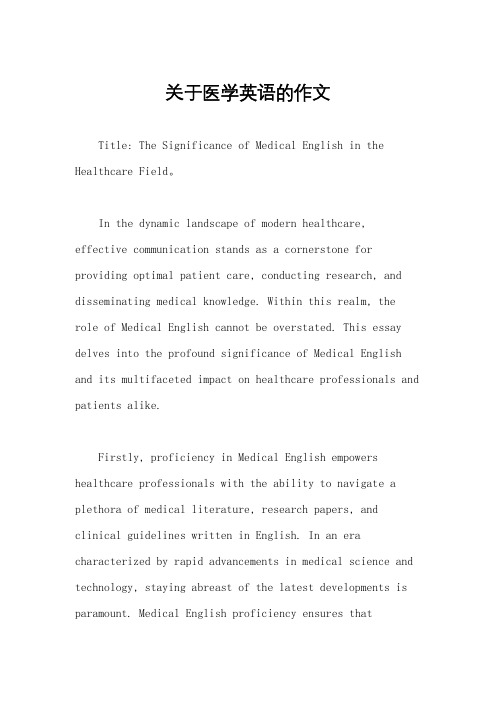
关于医学英语的作文Title: The Significance of Medical English in the Healthcare Field。
In the dynamic landscape of modern healthcare,effective communication stands as a cornerstone for providing optimal patient care, conducting research, and disseminating medical knowledge. Within this realm, therole of Medical English cannot be overstated. This essay delves into the profound significance of Medical English and its multifaceted impact on healthcare professionals and patients alike.Firstly, proficiency in Medical English empowers healthcare professionals with the ability to navigate a plethora of medical literature, research papers, andclinical guidelines written in English. In an era characterized by rapid advancements in medical science and technology, staying abreast of the latest developments is paramount. Medical English proficiency ensures thathealthcare professionals can comprehend and critically evaluate scholarly articles, thereby enriching theirclinical practice and decision-making processes.Moreover, Medical English serves as a universal language in the global healthcare community. With the proliferation of international collaborations, conferences, and research endeavors, effective communication among healthcare professionals transcends geographical boundaries. English proficiency facilitates seamless exchange of ideas, expertise, and best practices, fostering innovation and advancements in patient care on a global scale.Furthermore, for healthcare professionals hailing from non-English speaking backgrounds, proficiency in Medical English enhances career opportunities and professional mobility. Many prestigious medical institutions and academic journals require submissions and presentations in English, making proficiency in the language a prerequisite for career advancement and recognition on an international level. Additionally, proficiency in Medical English augments one's competitiveness in the global job market,opening doors to diverse career opportunities and collaborations across borders.Beyond the realm of academia and professional advancement, Medical English plays a pivotal role inpatient care and advocacy. Effective communication between healthcare providers and patients is indispensable for fostering trust, understanding, and adherence to treatment plans. In multicultural societies, where patients hail from diverse linguistic and cultural backgrounds, Medical English serves as a common medium for conveying medical information and ensuring patient comprehension. Moreover, proficiency in Medical English enables healthcare providers to engage in meaningful dialogue with patients, addressing their concerns, preferences, and cultural nuances with sensitivity and empathy.In addition to its instrumental role in clinical practice and research, Medical English proficiency holds profound implications for healthcare policy and public health initiatives. English serves as the lingua franca of global health organizations, such as the World HealthOrganization (WHO) and the Centers for Disease Control and Prevention (CDC), which disseminate vital information, guidelines, and recommendations to address global health challenges. Healthcare professionals proficient in Medical English are better equipped to access and contribute to these resources, thereby playing an active role in shaping healthcare policies and interventions on a global scale.In conclusion, Medical English stands as an indispensable tool in the arsenal of healthcare professionals, facilitating effective communication, collaboration, and knowledge exchange in the pursuit of optimal patient care and scientific advancement. Proficiency in Medical English not only enhances career prospects and professional mobility but also fosters cultural competence, empathy, and patient-centered care. As the healthcare landscape continues to evolve in an increasingly interconnected world, the importance of Medical English proficiency cannot be overstated. It is not merely a language skill but a gateway to excellence in healthcare delivery and a catalyst for positive change in the lives of patients worldwide.。
医学人文英语第三版下册u6作文
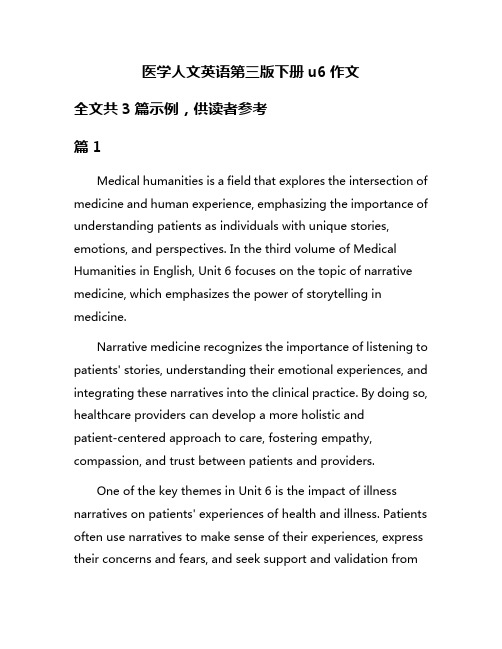
医学人文英语第三版下册u6作文全文共3篇示例,供读者参考篇1Medical humanities is a field that explores the intersection of medicine and human experience, emphasizing the importance of understanding patients as individuals with unique stories, emotions, and perspectives. In the third volume of Medical Humanities in English, Unit 6 focuses on the topic of narrative medicine, which emphasizes the power of storytelling in medicine.Narrative medicine recognizes the importance of listening to patients' stories, understanding their emotional experiences, and integrating these narratives into the clinical practice. By doing so, healthcare providers can develop a more holistic andpatient-centered approach to care, fostering empathy, compassion, and trust between patients and providers.One of the key themes in Unit 6 is the impact of illness narratives on patients' experiences of health and illness. Patients often use narratives to make sense of their experiences, express their concerns and fears, and seek support and validation fromhealthcare providers. By listening attentively to these narratives, providers can gain insights into patients' beliefs, values, and priorities, which can inform their treatment decisions and improve patient outcomes.Another important aspect of narrative medicine is the use of reflective writing and storytelling as a tool for personal and professional development. Healthcare providers can use writing and storytelling to reflect on their own experiences, emotions, and challenges, gaining insight into their own biases, limitations, and strengths. By engaging in self-reflection and sharing their stories with colleagues, providers can enhance their communication skills, empathy, and resilience, ultimately improving the quality of care they provide to patients.In addition, Unit 6 explores the ethical considerations of narrative medicine, such as the importance of respecting patients' autonomy, confidentiality, and privacy when sharing their stories. Healthcare providers must ensure that patients feel comfortable and empowered to disclose their narratives, without fear of judgment or exploitation. By upholding ethical principles and values, providers can build trusting relationships with patients, fostering a therapeutic alliance that is essential for effective communication and collaboration in healthcare.Overall, Unit 6 of Medical Humanities in English highlights the transformative power of narrative medicine in healthcare, emphasizing the importance of storytelling in promoting empathy, understanding, and healing. By integrating narrative approaches into clinical practice, healthcare providers can enhance the patient-provider relationship, improve patient outcomes, and foster a more compassionate and humanistic healthcare system. As healthcare professionals, it is essential to recognize the value of patients' stories, listen with an open heart and mind, and honor the humanity of each individual we care for.篇2Humanistic Care in Medical PracticeIntroductionAs medical professionals, it is not enough to simply possess the technical knowledge and skills to diagnose and treat patients. In addition to the medical aspect of healthcare, it is crucial for healthcare providers to also incorporate humanistic care into their practice. Humanistic care focuses on the emotional, psychological, and social needs of patients, recognizing them as individuals with unique experiences and feelings. In this essay, we will explore the importance of humanistic care in medicalpractice and discuss how it can improve patient outcomes and overall healthcare delivery.Importance of Humanistic CareHumanistic care is important in medical practice for several reasons. First and foremost, it helps build trust and rapport between healthcare providers and patients. By showing empathy, compassion, and respect towards patients, healthcare providers can create a supportive and trusting environment in which patients feel comfortable sharing their concerns and seeking help. This, in turn, can improve patient satisfaction and compliance with treatment plans.Secondly, humanistic care contributes to better clinical outcomes. Research has shown that patients who receive humanistic care are more likely to adhere to treatment regimens, experience less pain and anxiety, and have faster recovery times. This is because when patients feel understood and supported by their healthcare providers, they are more likely to actively participate in their own care and take steps to improve their health.Furthermore, humanistic care is essential for addressing the emotional and psychological needs of patients. Illness and injury can have a profound impact on a person's mental well-being,leading to feelings of fear, anxiety, and depression. By providing emotional support, reassurance, and counseling, healthcare providers can help patients cope with their emotions and build resilience in the face of adversity.Practical Strategies for Incorporating Humanistic CareThere are several practical strategies that healthcare providers can use to incorporate humanistic care into their practice. Firstly, active listening is key. By listening attentively to patients and acknowledging their concerns, healthcare providers can show that they care about the patient as a whole person, not just as a set of symptoms or a disease.Secondly, healthcare providers should practice cultural sensitivity and respect diversity. Patients come from a variety of cultural backgrounds, each with its own beliefs, values, and practices. By respecting and understanding these differences, healthcare providers can ensure that care is tailored to meet the individual needs of each patient.Thirdly, empathy and compassion are essential components of humanistic care. Healthcare providers should strive to understand the patient's perspective, show empathy for their emotions, and offer words of comfort and support. By connecting with patients on an emotional level, healthcareproviders can build trust and strengthen the therapeutic relationship.Finally, healthcare providers should involve patients in decision-making regarding their care. By empowering patients to participate in their own treatment plans, healthcare providers can promote autonomy and encourage patients to take an active role in managing their health.ConclusionIn conclusion, humanistic care is an essential component of medical practice that focuses on the emotional, psychological, and social needs of patients. By incorporating humanistic care into their practice, healthcare providers can build trust and rapport with patients, improve clinical outcomes, and address the emotional needs of patients. Through active listening, cultural sensitivity, empathy, and patient empowerment, healthcare providers can provide holistic care that treats the patient as a whole person, not just a set of symptoms. Ultimately, humanistic care is about recognizing the humanity in healthcare and striving to create a compassionate and supportive environment for patients to heal and thrive.篇3The Importance of Medical Humanities in HealthcareIntroductionThe field of medicine has advanced significantly over the years, with groundbreaking technological innovations, specialized treatments, and cutting-edge research. However, in the midst of all these advancements, it is important not to overlook the human aspect of healthcare. This is where medical humanities come into play – the integration of humanities disciplines like literature, philosophy, ethics, and history into medical education and practice. In this essay, we will explore the significance of medical humanities in enhancing patient care and the overall healthcare system.Empathy and CompassionOne of the key benefits of incorporating medical humanities into healthcare is the cultivation of empathy and compassion among healthcare professionals. By studying literature, for example, medical students can learn to appreciate the human experience, understand different perspectives, and develop a greater sense of empathy towards their patients. This can lead to improved communication, better patient-provider relationships, and ultimately, better health outcomes.Ethical Decision-MakingMedical humanities also play a crucial role in helping healthcare professionals navigate complex ethical issues that arise in the field of medicine. By studying ethics and philosophy, medical students can develop critical thinking skills, moral reasoning, and a deeper understanding of the ethical dilemmas they may face in their practice. This can help them make informed and morally sound decisions that prioritize thewell-being of their patients.Cultural CompetenceIn today's diverse and multicultural society, it is essential for healthcare professionals to be culturally competent and sensitive to the needs and beliefs of patients from different backgrounds. Medical humanities provide a platform for exploring cultural diversity, understanding the social determinants of health, and promoting inclusivity in healthcare settings. This can help healthcare professionals deliver more effective andpatient-centered care that respects the values and preferences of individuals from diverse communities.Narrative MedicineAnother important aspect of medical humanities is narrative medicine, which emphasizes the power of storytelling in healthcare. By listening to and reflecting on patients' stories, healthcare professionals can gain valuable insights into their experiences, emotions, and values. This can humanize the healthcare experience, foster trust and rapport between patients and providers, and enable a more holistic approach to patient care that takes into account the patient's unique narrative and context.Professional Well-BeingLastly, medical humanities can also benefit healthcare professionals themselves by enhancing their well-being and resilience in the face of the challenges and stresses of the healthcare environment. Studying humanities disciplines like literature and art can provide a source of meaning, inspiration, and self-care for healthcare professionals, helping them cope with burnout, moral distress, and emotional exhaustion. This can ultimately promote a healthier and more sustainable work environment that prioritizes the well-being of both patients and providers.ConclusionIn conclusion, medical humanities play a vital role in enhancing patient care, promoting ethical decision-making, fostering cultural competence, and supporting the well-being of healthcare professionals. By integrating humanities disciplines into medical education and practice, we can create a more humane, empathetic, and patient-centered healthcare system that values the human aspect of medicine alongside technological advancements. As we continue to advance in the field of healthcare, let us not forget the importance of the human touch and the power of the humanities to enrich our understanding and practice of medicine.。
医学方面英语作文模板

医学方面英语作文模板Title: Medical English Writing Template。
Introduction。
Medical English writing is an essential skill for healthcare professionals, researchers, and students in the medical field. Whether it's writing research papers, case reports, or patient records, clear and effective communication is crucial. This article will provide a template for writing medical English that can be applied to various types of medical writing.Section 1: Title and Abstract。
The title of the article should be concise and informative, clearly indicating the topic of the research or report. The abstract should provide a brief summary of the main findings or content of the article, including the research question, methods, results, and conclusions. It should be written in a clear and concise manner, allowing readers to quickly grasp the essence of the article.Section 2: Introduction。
- 1、下载文档前请自行甄别文档内容的完整性,平台不提供额外的编辑、内容补充、找答案等附加服务。
- 2、"仅部分预览"的文档,不可在线预览部分如存在完整性等问题,可反馈申请退款(可完整预览的文档不适用该条件!)。
- 3、如文档侵犯您的权益,请联系客服反馈,我们会尽快为您处理(人工客服工作时间:9:00-18:30)。
Permanent implantation of electrodes was thus necessary to achieve reproducible recordings in our study.
Step Four of Move 2
It compares and contrasts our new
Three Moves
Highlighting the overall research
outcome
Explaining specific research outcomes Stating research conclusions
Move 1 Highlighting the overall research outcome Move 1 of the discussion is often an explicit affirmation that the researchers performed the experiments that they set out to perform, or answered their research question.
主要回答在introduction部分提出的科学问 题,以及主要支持的论据
●
Our data support the hypothesis that taking aspirin or other non-steroidal antiinflammatory drugs protects against the development of colorectal cancer and suggest that it does so by reducing the prevalence of colorectal adenomas.
●
Move 3
In clinical papers, there will be a statement of the implications for patient care.
●
The measures used in our study may help to identify treatment methods that...
Move 1 Sentence Patterns
This study investigated the effect of... on ...
This study investigated the effectiveness
of... in [verb] + ing
●
This study investigated the effect of a community-based educational program on quality of life among patients suffering from Parkinsonism.
Move 2 Explaining specific research outcomes
Move 2 of the discussion is much more
extensive, reviewing and explaining the
results in detail.
Five Steps of Move 2
program can improve the quality
of life of patients with Parkinsonism.
(present tense)
Step Two of Move 2 It is an explicit statement of the significance of the results.
Discussion
The discussion may be the most
challenging part of the paper to write since we have to make sense of results which are seldom exactly as anticipated.
including external validity.
●
Some limitations of the current study are the
relatively small sample size and ...
Move 3 Stating research conclusions
●
In summary, the spinal cord undergoes viscoelastic relaxation during sustained compression.
Discussion
In order to avoid difficulty, the discussion
should focus on the results of the current study and not extrapolate too broadly. An effort must be made to relate the findings of the current work to established knowledge and current theories. This is where the average reader looks for value -- in the synthesis of new information to create a broader understanding of a particular area of science.
Step Four of Move 2 This comparison is a crucial step in demonstrating how our study contributes to the common body of knowledge. It essentially justifies the performance of the research (and publication of the paper), and may represent a particularly vulnerable point for clinical studies.
in those we have cited.
Step One of Move 2
It is a reiteration of the main observations.
the structure [verb] + that ...
●
This study found that a community-based
It is a reiteration of the main observations. It is an explicit statement of the significance
of the results.
It justifies the results by confirming that the
●
The importance of these findings is that ... A significant outcome of this study is that…
●
(present tense)
Step Three of Move 2
It justifies the results by confirming that the methods were appropriate to the research question.
methods were appropriate to the research question.
It compares and contrasts our new results
with those of previous studies.
It discusses the limitations in our paper and
●
In conclusion, the significance of this study is that ...
Move 3 This move most often provides the “yes or no” answer to our hypothesis, or makes the definitive statement about what the study has achieved. There is likely to be a statement of research questions which arise from this study, and therefore suggestions for further research. What needs to be investigated further is whether or not ...
educational program improved the quality of
life of patients with Parkinsonism.
(past tense)
Step One of Move 2
●
These findings suggest that a
community-based educational
Model British Medical Journal, Logan et al.1993 ① Main information
② Critical assessment
③ Comparison with other studies
④ Conclusion
Model ① Main Information (主要信息)
